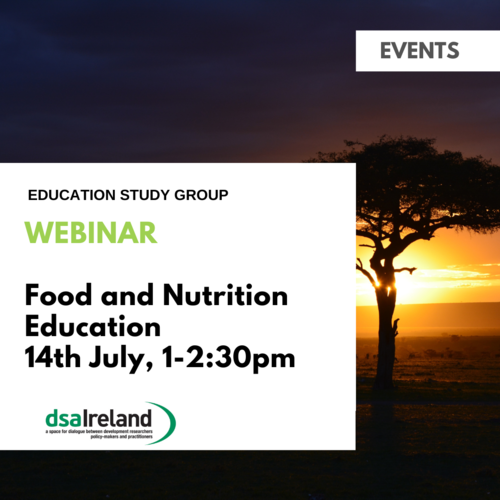When: 14 July 2021, 13.00-14.30
Regsiter: Zoom Meeting Link (ID and passcode below)
Food and nutrition education: The challenges with education, behaviour change and translation into practice with food and nutrition sensitive programmes
The Right to Food (RTF) – that is, healthy food - is internationally recognized and embodied in the Sustainable Development Goals (SDGs). Malnutrition of all kinds is a leading cause of death worldwide; more so in these days of extreme stress. Like other human rights, the RTF is expressed in the form of government obligations to its citizens. Yet for all the players (including consumers), the pathways to better food, diets and nutrition are not self-evident. Different strategies (often uncoordinated) are adopted or advised in terms of education; health services; government regulations, policies and programs; investment; food security and livelihoods; agriculture (including fisheries, animal husbandry, homesteads and biofortified foods); social protection; and the food system.
Actions related to the current Decade of Action on Nutrition has been particularly interested in how these strategies can become “nutrition-sensitive”, that is, what they can or might contribute to promote good nutrition or combat malnutrition, separately or together. Frameworks for action (e.g. The Second International Conference on Nutrition Framework for Action) lay out the sectoral possibilities but do not assess them. Any government or agency interested in making an impact has to ask which are most successful and long-lasting initiatives and what combinations work best.
This webinar will deal with two kinds of initiative:
(a) “Food for Education”, which explores education that aims to enable children to understand good nutrition and
(b) “Food and nutrition Education” which helps people to make the best of their own food environments in all contexts, including outside interventions.
How such initiatives can be assessed and decided upon is a key factor. The webinar tackles this main question, with a particular focus on education related initiatives, and will be interactive and engaging with audience opinions and experience from several sectors, projects and programs. Key questions that will be addressed include:
• How can successes and lessons from these initiatives be linked to global policy and debates?
• Which strategies are most successful in achieving better food, diet and nutrition?
• What is the role of nutrition sensitive education?
Presenters:
JANE SHERMAN was for many years a consultant in nutrition education at the Food and Agriculture Organization of the United Nations (FAO) and led the ENACT team in developing materials for capacity development in nutrition education in Africa. She has an MA from Oxford University and three other Masters degrees in education, literature and linguistics, with some research in testing and comprehension and further training in course design, materials development and use of learning platforms. She has long experience of education systems (testing, examining, course design, materials development, independent and distance learning, university teaching, professional training and work-related learning). She has published many articles and books in these fields and has developed specialised training courses in (among other things) project formulation and management, evaluation, report-writing and food safety. Her particular educational interests are independent and distance learning, methodology, experiential learning, participatory approaches, course design and use of visual media. In the last ten years she has worked mainly in nutrition education, mainly for FAO, producing manuals on school nutrition education curricula and school gardening and nutrition education materials for Zambian elementary schools, carrying out capacity/needs analysis on nutrition education training in Africa and designing and producing the ENACT course in nutrition education training. She has advised on nutrition education training for agriculture extension workers and nutrition education programs in Malawi schools, has reviewed and advised on nutrition education tools and has written reports on school gardening in subSaharan Africa, a chapter on community-based nutrition education and literature reviews of nutrition education needs and training needs. She is convinced that nutrition education is an essential but undervalued element in global programs for improving diet and health and that schools, have a vital role to play.
PETER MUHANGI is a food security and livelihoods specialist with over 25 years professional experience supporting capacity strengthening and programming in food security, livelihoods and social protection in more than 20 countries mainly in Africa. Peter holds a Master of Arts Degree in Public Policy and Management), as well as post graduate qualifications in Poverty Reduction Policy, Project Management and Planning. Peter has over 10 years’ experience working on secondments to Governments and the Southern Africa Development Community (SADC) on food security, livelihoods, and vulnerability analysis capacity strengthening for programme design, monitoring, evaluation and uptake of learning. Peter is the current Global Lead on Food Security and Livelihoods for Plan International, based in Uganda, and previously he has worked for the International Federation of Red Cross and Red Crescent Societies (IFRC), the UN Food and Agricultural Organisation, Save the Children International, the UN World Food Programme, UNICEF and OXFAM, in addition to short term consultancies on food security and livelihoods in humanitarian and development contexts.
Meeting ID: 834 1858 9409
Passcode: 158300
